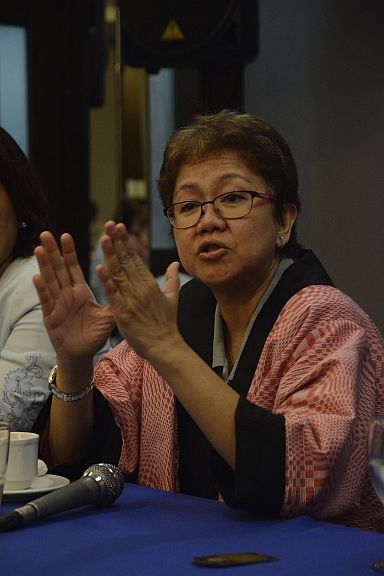
Economics professor Dr. Maria Cristina G. Bautista paints a rosy economic picture for the country during a forum organized by Duros Group. (CDN PHOTO/CHRISTIAN MANINGO)
An economist sees a “bright and rosy” future for Cebu and the Philippines, in general, as central banks in the US, Japan and some European countries impose negative interest rates.
“If you’re looking for bad news, it won’t come until three or four years,” Ateneo de Manila University professor Dr. Maria Cristina G. Bautista said in a press conference prior to her presentation during an economic forum organized by Padgett Place yesterday.
Bautista noted that with negative interest rates prevailing in the largest economies in the world, the Philippines which is now known to be among the strongest in Asia, stand to benefit from capital inflows.
“Money has to go where it earns. Where will it earn? It’s negative in Japan, negative in the US. Where will it go? It comes here, to countries that are stable and have good ratings,” she said.
The presidential elections in May could create some bumps for the local economy, but Bautista said she was confident that the Philippines would ride out any election-related uncertainty.
“If it’s a peaceful and honest elections, those with money will probably wait and see a bit, but money has to land somewhere,” she said.
In Cebu, she noted that tourism has been boosting the local economy, which is among the better performing regional economies in the country.
“It’s so heartening to see a lot of tourists here. If you can get more cruise ships, for example, it would also boost tourism,” she said.
Citing data compiled by a colleague, Bautista said Cebu contributes about 6 percent to the country’s economy.
“I’ve been away (from Cebu) for 30 years and wow! That’s the first thing I said when I got to the Mactan Bridge. The skyline is different,” she said.
However, she also cited the worsening traffic congestion in Metro Cebu as a challenge that needs to be addressed.
“Traffic here is not far from (that of) Manila,” she said.
Other challenges, which Bautista refers to as “shadows in the Philippine economy,” are the need to achieve a balanced lifestyle, rising mental health concerns, and the uncertainty in the Middle East which could send a lot of overseas Filipino workers (OFWs) home and cause a decrease in OFW remittances.
Bautista noted, however, that some returning OFWs have been able to find alternative sources of income in the country. The professor, who goes around Metro
Manila in Uber or Grab cars, said most of the drivers were either former OFWs or relatives of OFWs.
How to get to the “bright and rosy picture” that she painted would need “Ubuntu,” an ancient African word that means “I am what I am because of who we all are.”
In the Philippines, Bautista said there’s a need to discard crab mentality and “get our acts together” to sustain a strong economy.
Philippine gross domestic product (GDP) grew by 5.8 percent in 2015, making the country among the fastest growing in Asia. Former Socioeconomic Planning
Secretary Arsenio Balisacan had described the growth as “respectable” given the external challenges last year.
The economy is targeted to grow between 6.8 percent and 7.8 percent this year.